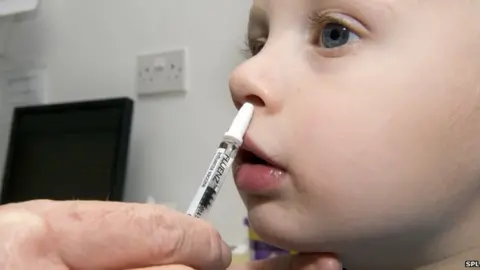Flu vaccine very effective in children, but not elderly
 SPL
SPLLast winter's vaccine reduced the risk of flu by 66% in children, according to Public Health England, up 8% on last year.
It's the best result since 2013, when children first received flu vaccinations.
In adults aged 18-64 years, the vaccine reduced the risk of flu by about 40%.
The UK plans to offer the flu vaccine to all children aged two-11 years. This can have widespread benefits, as children "spread flu more than others".
The vaccine, however, did not work in those aged over 65.
This was because it did not protect the elderly against the H3 flu strain, which circulated last winter.
A PHE official told the BBC: "As people age, their immune systems are often weaker and therefore their bodies may not respond as well to a vaccine as younger people's bodies,"
'Best defence'
But it was still very important the elderly continued to be vaccinated.
"Vaccines are the best defence we have against flu and not only protect people who have received the vaccine but also those around them," said Jenny Harries, deputy medical director for PHE.
Prof John McCauley, who leads influenza research at the Francis Crick Institute, in London, said the findings regarding the elderly were "significantly disappointing".
"If it was to continue at this level, it really brings into question whether the vaccines available for use are the best possible," he said.
But he added: "The effectiveness for the vaccine in the children at nearly two-thirds is pretty good for a one-off dose."
Children are known to be "super-spreaders" of flu, so protecting them can have beneficial flow-on effects.
"We know children can spread flu more than others, and if we can keep them well, it means that the infection is less likely to pass to those who are at high risk," said Dr Harries.
New vaccines
Every year, the World Health Organization picks the three strains of flu most likely to be circulating. A flu vaccine normally works in 50 out of every 100 cases.
'We're looking at what happened and better options to protect the elderly," PHE's head of flu surveillance, Richard Pebody, told the BBC.
These are likely to include high-dose and adjuvanted vaccines, which increase the body's immune response to the vaccine.
Some of these are likely to be available the winter after next.
"As time goes on, there will be other options," Mr Pebody said.
